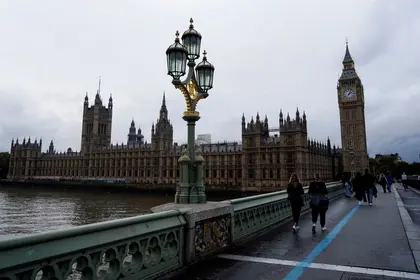European lawmakers gathered in London on Dec. 8 to share ideas about economic aid to Ukraine. Inevitably, talks turned to how to help Kyiv win the war and keep Russia at bay.
London once again became the epicenter of discussions on the future of Ukraine as lawmakers and politicians sat down to debate the economic present and future of the country with the New Europeans, a pro-European Union civil society organization. The gathering focused on the economy and international aid, but conversations rapidly turned to the military situation and the absolute need for the conflict to be resolved without a temporary ceasefire.
JOIN US ON TELEGRAM
Follow our coverage of the war on the @Kyivpost_official.
Speaking to Kyiv Post before the event, Oleksiy Honcharenko, Ukrainian Deputy and representative to the Parliamentary Assembly of the Council of Europe, expressed his hopes for the discussions.
“It is very important to raise all issues connecting to Ukraine, and here we will speak about both security and economics. Both are vital for Ukraine. Security – it is clear why. Economics is also very important as one of the aims of Putin is to destroy the Ukrainian economy.”
“Every businessman and any person who is working and continuing to work, and any person who is considering investing in Ukraine, who is supporting business in Ukraine – they are also heroes. Heroes of the economic front line. There is an actual military front line, a political frontline, diplomatic, informational, but there is also the economic front line. We need to do everything we can to support this economic frontline and this battle is also extremely important.”

N. Korean Troops Massed in Russia to Enter Ukraine War ’Soon’: Pentagon Chief
With the third high level event dealing with the economic present and future of Ukraine in as many weeks taking place in London, Honcharenko reiterated the scale of the work at hand and the historical importance of establishing a new Ukraine, removed from its colonial Soviet past.
Honcharenko said “When we will rebuild the country, in reality we should say build the country, because we don’t want to rebuild Soviet Ukraine. Rather, we need to build a new Ukraine – which will need enormous funding.”
The cost of reconstructing Ukraine is ever increasing, with newly liberated lands offering more evidence of Russian destruction and continued bombardment damaging the civilian infrastructure of the country. Conscious of the damage being caused by the Russians, Western politicians are becoming unnerved by the reconstruction costs being passed on to their taxpayers. Honcharenko was adamant that this should not be the case.
“It isn’t the British, American or French taxpayers who should pay for this, but Russia and Russian citizens and the entourage of Putin, who are guilty of what has happened.”
Honcharenko added, “In the parliamentary assembly of the council of Europe we adopted a resolution which says that the first to receive money should be Ukrainian citizens and not Russian companies like Yukos, or any others. It is important for us to insist on this position that Ukraine, Ukrainian citizens and Ukrainian companies should be the first in this line.”
Despite the economic focus of the gathering, it was difficult to keep the discussion away from military matters and the war. Speaking to Kyiv Post, Pawel Kowal, member of the Polish parliament and chairman of the Foreign Affairs Committee, outlined his vision of the main challenges facing Ukraine and what the focus of Western politicians should be.
“The first point is financial – for the everyday expenses of Ukraine… The second point is the energy crisis. We should react and mobilize, especially us Poles, we should mobilize Western politicians in supporting Ukraine in the context of the general plan of total destruction of critical infrastructure. Third point – weapons. We should rethink our model of support. Ukraine must also have more offensive weapons. I mean Ukraine should have the technical possibility to attack targets in Russia.”
Kowal also expressed the need to look ahead and ensure the security of Ukraine beyond the conflict, reflecting that is also in the interest of the neighboring countries.
“We should open the door to NATO and should give Ukraine a membership action plan… I think it’s clear that Ukraine should have strong security guarantees for the postwar period and it should be a potential member of NATO at the moment and finally [have] full membership.”
Ukraine’s journey to become a fully pledged NATO member is also subject to approval from other states in the alliance, some of whom have already been reluctant to offer support. Since February, the Hungarian government of Victor Orban has been unwilling to approve economic support for Ukraine and has refused to participate in supporting Ukraine’s defense against Russia militarily.
Pawel Kowal offered his comments on the policies of the Hungarian prime minister.
“I expect that in Hungary the Hungarians will change their government’s perspective. Today Orban is the main problem in Europe, because he has been blocking real support for Ukraine.”
Kowal added, “He is a pure revisionist. For Poland it is a serious problem, the fact that Orban promotes the policy of revisionism in Europe.”
With Ukraine’s NATO membership not on the table, there is another option open for regional security cooperation – that of regional alliances. Poland has already been touted as the main regional power, considering their EU and NATO membership, and strong military and political support of neighbors under Russian attack. Kowal said, “Strategically, Poland should think about a new treaty with Ukraine on close links that we established.”
“We should be more active, but I would like to emphasize that Poland is the most active country in Central Europe in the context of the war because it is in our national interest. We should be more active in the creation of the anti-Putin coalition and be very close to our European partners, to Great Britain, the U.S. and Canada.”
You can also highlight the text and press Ctrl + Enter






